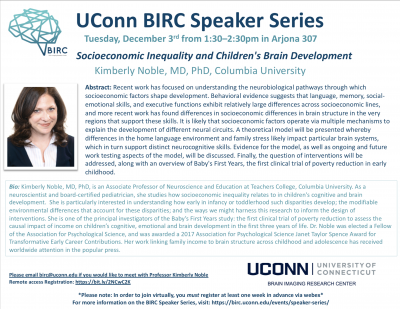Tuesday, December 3rd from 1:30-3:00 pm in Arjona 307
Abstract: Socioeconomic disparities in childhood are associated with remarkable differences in cognitive and socio-emotional development during a time when dramatic changes are occurring in the brain. Recent work has focused on understanding the neurobiological pathways through which socioeconomic factors shape development. Behavioral evidence suggests that language, memory, social-emotional skills, and executive functions exhibit relatively large differences across socioeconomic lines, and more recent work has found differences in socioeconomic differences in brain structure in the very regions that support these skills. It is likely that socioeconomic factors operate via multiple mechanisms to explain the development of different neural circuits. A theoretical model will be presented whereby differences in the home language environment and family stress likely impact particular brain systems, which in turn support distinct neurocognitive skills. Evidence for the model, as well as ongoing and future work testing aspects of the model, will be discussed. Finally, the question of interventions will be addressed, along with an overview of Baby’s First Years, the first clinical trial of poverty reduction in early childhood.
Bio:Kimberly Noble, MD, PhD, is an Associate Professor of Neuroscience and Education at Teachers College, Columbia University. She received her undergraduate, graduate and medical degrees at the University of Pennsylvania. As a neuroscientist and board-certified pediatrician, she studies how socioeconomic inequality relates to in children’s cognitive and brain development. Her work examines socioeconomic disparities in cognitive development, as well as brain structure and function, across infancy, childhood and adolescence. She is particularly interested in understanding how early in infancy or toddlerhood such disparities develop; the modifiable environmental differences that account for these disparities; and the ways we might harness this research to inform the design of interventions. She is one of the principal investigators of the Baby’s First Years study: the first clinical trial of poverty reduction to assess the causal impact of income on children’s cognitive, emotional and brain development in the first three years of life. Dr. Noble was elected a Fellow of the Association for Psychological Science, and was awarded a 2017 Association for Psychological Science Janet Taylor Spence Award for Transformative Early Career Contributions. Her work linking family income to brain structure across childhood and adolescence has received worldwide attention in the popular press.
Please email birc@uconn.edu if you are interested in meeting with a speaker. Click here to see the full BIRC Speaker Series schedule and access recordings of past talks.
